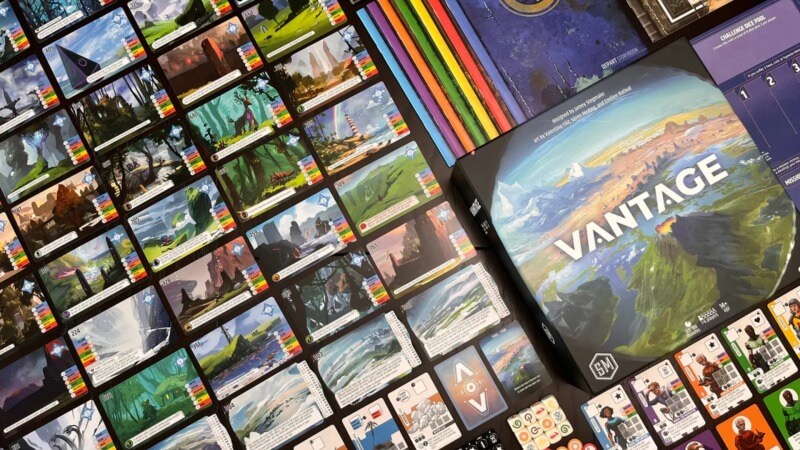The Board Game Vantage Is Too Big for Its Own Good
Images courtesy of Stonemaier Games
Vantage is the newest game from Jamey Stegmaier, designer of Scythe and Viticulture as well as publisher of Wingspan, but it’s something completely different—a cooperative adventure game that has an enormous amount of content in the box so that you can play it repeatedly and get different experiences each time. It is clearly a huge labor of love for Stegmaier that took around seven years for him to complete. The concept, the art, and the story are all very impressive, but I simply can not imagine bringing this game to the table with anyone but the most experienced gamers—and even then, I’d be worried about how much time we’d all spend referring to rulebooks and looking for clarifications online.
Vantage is an open-world exploration game, where players work together to complete at least one mission or destiny card, and with over 1700 cards in the box it offers many different paths for you to play the game again and again. It takes the experience of those great Choose Your Own Adventure books from the 1980s—there are a couple of actual CYOA games out there, by the way—and brings it to the tabletop with a massive sci-fi experience. The players are space travelers whose ship has crashed on an unfamiliar, inhabited planet, and they’ve been scattered by the crash so that they can communicate but can’t see each other. Thus each player will pursue their own separate adventure within the larger one, talking to other players without disclosing their precise location (not that it would help anyway, given how the game is designed). Each play session starts with one Mission card that players will try to complete, but along they way they can pick up other Destiny cards that present different win or completion conditions. After any session, you return all cards to their places in the box, in order, saving nothing—each play is self-contained, with no campaign or legacy elements.
The heart of the game is the action system, which involves rolling ‘challenge dice’ and using skill tokens and/or open spaces on your cards to try to mitigate negative rolls. Every location card has from one to six possible actions listed on it, each tied to a color. When you select an action, you pick up the booklet matching that color and look up the entry for the location’s number. That entry lists a cost in dice: You must roll that many challenge dice, which can reduce your health, morale, or time, reducing the dice count by one for every matching skill token you can discard. Your action always succeeds, however, unlike most games of this ilk (or the CYOA books; I definitely died a lot reading those), so Vantage allows you to lean into the thematic elements rather than forcing you to consider what you can afford—although that’s a mixed blessing, as I’ll get into later.
 Keep scrolling for more great stories.
Keep scrolling for more great stories.
